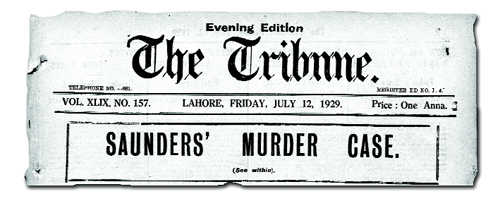Sarika Sharma
Tribune News Service
Chandigarh, October 18
“The ideal of our party was attainment of complete freedom and to attain it we practice terrorism.” These were the words of approver Phanindra Nath Ghosh during the magisterial trial in the 1929 Lahore Conspiracy Case.
Ghosh said this during the cross-examination by Bhagat Singh’s comrade Shiv Verma, who forced him to speak the truth.
Before the special tribunal headed by GC Hilton ordered hanging of Bhagat Singh and his comrades, a trial of the revolutionaries went on for almost 10 months in a specially designated court at Central Jail, Lahore. It was presided over by Special Magistrate Sri Krishna. On May 4, 1930, the trial was taken over by the special tribunal.
While the complete record of the magisterial trial has never been available, some of it forms part of the 160 files lying at Punjab State Archives in Lahore. Files 57 to 60 contain records related to the trial that took place between July 10, 1929 and May 4, 1930; later, the trial was conducted by a special tribunal.
According to historian Malwinderjit Singh Waraich, even the cross-examination questions were obfuscated by the court, “which are important to study the mind and conduct of the court itself”.
File 57 has more than 1,600 pages and holds records of statements transferred from the special magistrate to the special tribunal. According to Dr Aparna Vaidik — the first to gain access to the files — the cyclostyled file has a list of all the statements that were transferred. “The ones which were transferred are in binding,” she notes. The next three files — 58, 59 and 60 — contain the proceedings of Special Magistrate Sri Krishna’s court.
Historians say the magisterial trial was of immense importance as it was the only trial in which Bhagat Singh and his comrades participated; they boycotted the special tribunal. “Their hunger strike happened during this period and it was very important as far as their struggle was concerned; Jatin Das lost his life during it. This is the period when they quite actively took part in the proceedings and cross-examined witnesses, especially the approvers from whom they tried to establish the objectives and ideology of the Hindustan Socialist Republican Association,” says Harish Jain, a Chandigarh-based publisher and Bhagat Singh researcher.
While there is mention of the proceedings in the contemporary newspapers, details of the trial are not much known as the records pertaining to it are not accessible. This is because though the special tribunal took over the records of the magisterial trial, much of these did not form the part of the tribunal proceedings.
What is known is that the lengthening trial of the magisterial court was generating sympathy for the revolutionaries, causing a lot of heartburn in the British administration. To cut it short, the Viceroy promulgated an ordinance to establish a special tribunal consisting of three High Court judges.
On May 5, 1930, it took over the trial from the Special Magistrate, which was soon boycotted by the revolutionaries after the merciless beating of Bhagat Singh in the court.
On another occasion, the magistrate ordered them to display good behaviour to which the revolutionaries replied that they had not come to be taught in a school, but to receive justice in the court.
Unlock Exclusive Insights with The Tribune Premium
Take your experience further with Premium access.
Thought-provoking Opinions, Expert Analysis, In-depth Insights and other Member Only Benefits
Already a Member? Sign In Now










